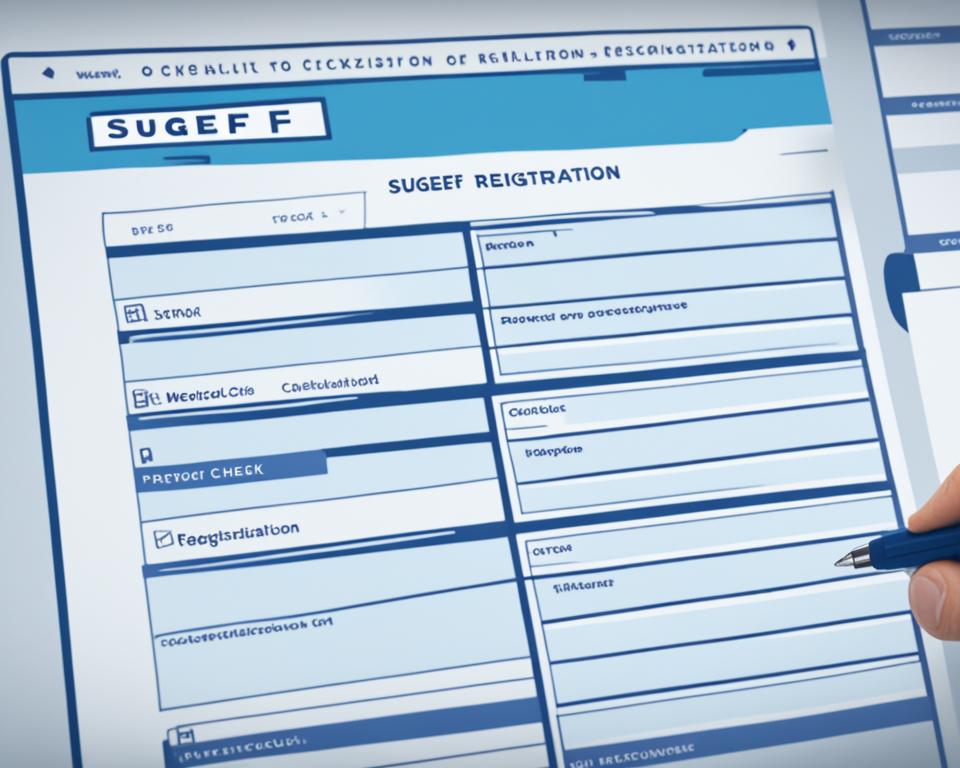
Lenders in Costa Rica: Understanding SUGEF Registration
Financial entities in Costa Rica must know about SUGEF registration. This is essential to avoid big fines and legal troubles. We’ll look into the rules of SUGEF registration, your duties, and what happens if you don’t follow them. This will help your company be clear and ethical in its operations.
Key Takeaways
- SUGEF registration is mandatory for all financial entities, including private lenders, to access banking services in Costa Rica.
- Compliance with SUGEF regulations ensures the stability, solidity, and efficiency of the national economic system.
- Failure to comply with SUGEF regulations can result in fines, license revocation, and legal consequences for financial entities.
- SUGEF’s oversight covers various financial institutions, including banks, savings and credit cooperatives, and private lenders.
- Obtaining a Firma Digital (digital signature) is a crucial first step in the SUGEF registration process.
How essential is SUGEF registration for private lenders in Costa Rica, and what are the consequences of non-compliance? These are key questions we will answer. We’ll explore why SUGEF compliance is vital for financial companies in Costa Rica.
What is SUGEF?
SUGEF stands for Superintendencia General de Entidades Financieras. It is in charge of keeping the Costa Rican financial world in check. One of its goals is ensuring the financial system is stable and runs smoothly. It also keeps an eye out for any signs of money laundering or financing terrorism.
SUGEF’s Objectives and Roles
SUGEF is a key player in making sure Costa Rica’s financial sector is honest and clear. It works towards various important goals.
- Keeping the financial system stable and strong
- Helping financial institutions in Costa Rica operate efficiently
- Looking for and stopping money laundering and terrorism financing risks
- Making everyone follow the financial rules in Costa Rica
- Protecting the people who use financial services
Financial Entities Regulated by SUGEF
Many different financial groups in Costa Rica fall under SUGEF’s watch. This includes:
- Banks
- Savings and credit cooperatives
- Financial firms
- Foreign exchange firms
- Private lenders
All these entities have to register with SUGEF. They must follow the rules and let the agency watch over them. This is all to keep the Costa Rican financial scene secure and honest.
SUGEF Registration: Mandatory for Private Lenders
In Costa Rica, all private lenders must get SUGEF registration to use local banking. This step makes sure private lenders follow the law and protect their customers. It means they understand and stick to all the financial rules in Costa Rica.
Importance of SUGEF Registration
Getting SUGEF registration is key for private lenders in Costa Rica. It helps keep the country’s economy strong and safe. When they join SUGEF, private lenders show they are honest, care about doing things right, and help stop bad money use.
Activities Requiring SUGEF Registration
Lots of financial groups need to register with SUGEF to use Costa Rica’s banks. This includes banks, credit unions, money firms, foreign money exchange places, casinos, real estate sellers, and more. If they don’t get registered, they can face big fines or lose their ability to work legally.

For private lenders in Costa Rica, signing up with SUGEF is very important. It lets them keep working closely with local banks. Gap Investments helps them understand how to register and follow the rules.
Lenders and SUGEF Registration
Private lending is key in the financial world in Costa Rica. While this is vital, private lenders have rules to follow. These are from the Superintendencia General de Entidades Financieras (SUGEF). They need SUGEF Registration to use local banking services.
SUGEF applies to many finance businesses. This includes banks, cooperatives, and private lenders. To get SUGEF registration, you need a Firma Digital. This makes sure all financial groups follow the same rules in Costa Rica.
Breaking SUGEF’s rules is serious. It could lead to closing bank accounts. Gap Investments helps private lenders. They help in getting the needed Firma Digital and following SUGEF’s requirements.
Getting SUGEF Registration is very important for private lenders in Costa Rica. It keeps them eligible for local banking services. This also helps make sure they meet their credit facility providers obligations. Compliance is crucial to avoid any business troubles or penalties for not following rules.

Getting Started with SUGEF Registration
The start for many lenders is getting a Firma Digital card. This card is key since the whole sugef registration process happens online. Firma Digital is just for Costa Rican people or those who live there. But if you’re a non-resident lender, you can get a notary public to help you out.
Obtaining a Firma Digital
A Firma Digital is really important for financial compliance in Costa Rica. This digital signature lets you safely use the SUGEF online system. You need it to finish your registration and get approved. Getting your Firma Digital is clear but you must take the right steps to stay legal.
Alternative for Non-Resident Lenders
If you’re a non-resident lender looking to work in Costa Rica, there’s another way. You can meet the lending authorization costa rica needs by having a notary public help you out. This way, SUGEF registration process is easier for non-residents. You can then get the approvals needed to lend in Costa Rica.

Consequences of Non-Compliance
Not following SUGEF’s rules can hurt banks in Costa Rica a lot. This might lead to big fines and losing their banking licenses. They could also face legal trouble. Not meeting these regulations can harm their name and make clients doubt them.
Breaking SUGEF’s rules could mean paying big penalties. The fines for not playing by the financial laws of Costa Rica can really damage the bank’s financial health. This could shake the bank’s stability and future.
Doing this many times or really badly could make the bank lose its right to operate. This means they would have to stop working. Clients would have trouble using banking services. The bank could face more legal troubles and fines too.
Not following SUGEF’s rules can severely harm a bank’s credibility in Costa Rica. This drawback makes it hard for a bank to win back trust. It affects the business’s ability to keep clients and bring in new ones. The loss of trust really stands in the way of doing well in the financial field.

To dodge these problems, Costa Rican banks need to follow SUGEF’s rules closely. By ensuring strict compliance, they can avoid these pitfalls. This protects their image and keeps clients happy, allowing them to work smoothly in Costa Rica’s finance sector.
SUGEF’s Impact on Financial Entities
SUGEF registration greatly affects financial entities in Costa Rica. It ensures they follow the nation’s strict financial rules. These include tough reporting requirements and capital requirements. Not following these rules can lead to big fines, loss of permits, and legal trouble.
Compliance Regulations
Costa Rica’s financial groups must meet many compliance requirements from SUGEF. They need to keep up with financial reporting and risk management.
Failure can severely harm a group’s activities and standing in the
Costa Rica financial sector
.
Obligations for Financial Entities
Getting registered with SUGEF means these firms must show transparency. They have to share their financial moves and give important facts to customers. They must also strictly obey all laws and rules. These duties help keep people safe and the national financial setup strong and trustworthy.

Taxation for Private Lenders in Costa Rica
Being a private lender in Costa Rica means knowing the tax rules for your loans and investments. The Superintendencia General de Entidades Financieras (SUGEF) doesn’t handle taxes. Instead, you have to register with the Costa Rican government’s tax agency, Tributación, and follow their tax laws.
Tax Rates and Filing Requirements
If you lend money privately in Costa Rica, you’ll face capital gains tax and interest income tax. The capital gains tax you pay can be between 2.25% and 30%. This varies based on your investment type and how long you’ve held it. Interest income from your loans will have a flat tax rate of 15% for people and 30% for companies.
To stay on the right side of the law, file your taxes regularly with the Costa Rican tax agency. Include details about your interests, expenses you can deduct, and any profits or losses from loans you’ve made.
Foreign Tax Credits
If you’re not from Costa Rica but investing there, you might get a break on your foreign taxes. This is where foreign tax credits come in. It’s wise to get help from a good accounting and tax service in Costa Rica, like the one at Gap Investments. They will guide you through the tax system and help you claim any deductions or credits you qualify for.
Knowing Costa Rica’s rules on taxes means your lending operation will run smooth. Plus, you’ll get the most out of your investments by planning for taxes wisely and following the law.

Conclusion
SUGEF registration is key for financial firms in Costa Rica. It ensures they’re open and honest. This leads to safe, trusted banking for everyone in the country.
By signing up with SUGEF, these companies promise to help keep the financial system running smoothly. They also agree to follow Costa Rica’s money rules.
Our article looked at why SUGEF registration matters, what happens if a firm doesn’t follow the rules, and what they must do to comply. The whole process, from getting a digital signature to keeping up with taxes, can seem like a lot. But it’s all about making sure the financial world is fair and safe for its users.
Got any questions? Need help understanding SUGEF or other financial rules in Costa Rica? Talking to a legal expert can offer personalized advice. Staying open, acting with integrity, and knowing the rules help these financial firms keep Costa Rica’s economy on the right track.
FAQ
What is SUGEF and what are its objectives?
Who is required to register with SUGEF?
What is the process for obtaining SUGEF registration?
What are the consequences of non-compliance with SUGEF regulations?
How does SUGEF registration impact financial entities in Costa Rica?
Is SUGEF connected to taxation in Costa Rica?
Source Links
- https://gapinvestments.com/en/lenders-and-sugef-registration/
- https://gapinvestments.com/en/sugef-and-taxation-in-costa-rica/
- https://www.specialplacesofcostarica.com/blog/how-to-get-a-mortgage-in-costa-rica/
- http://corderoabogados.com/wp-content/uploads/2018/09/ICLG-to-Lending-_-Secured-Finance-COSTA-RICA-2018-Printed-Version.pdf
- https://gapinvestments.com/en/inner-circle/
- https://gapinvestments.com/en/faq/
- https://gapinvestments.com/en/about-sugef-and-taxation-in-costa-rica/
- https://www.gapequityloans.com/en/costa-rica-home-equity-loans-guide/
- https://gapinvestments.com/en/understanding-sugef-costa-rica/
- https://gapinvestments.com/en/costa-rica-investments/
- https://gapinvestments.com/en/secure-loans-in-costa-rica/
Article by Glenn Tellier (Founder of CRIE and Grupo Gap)
